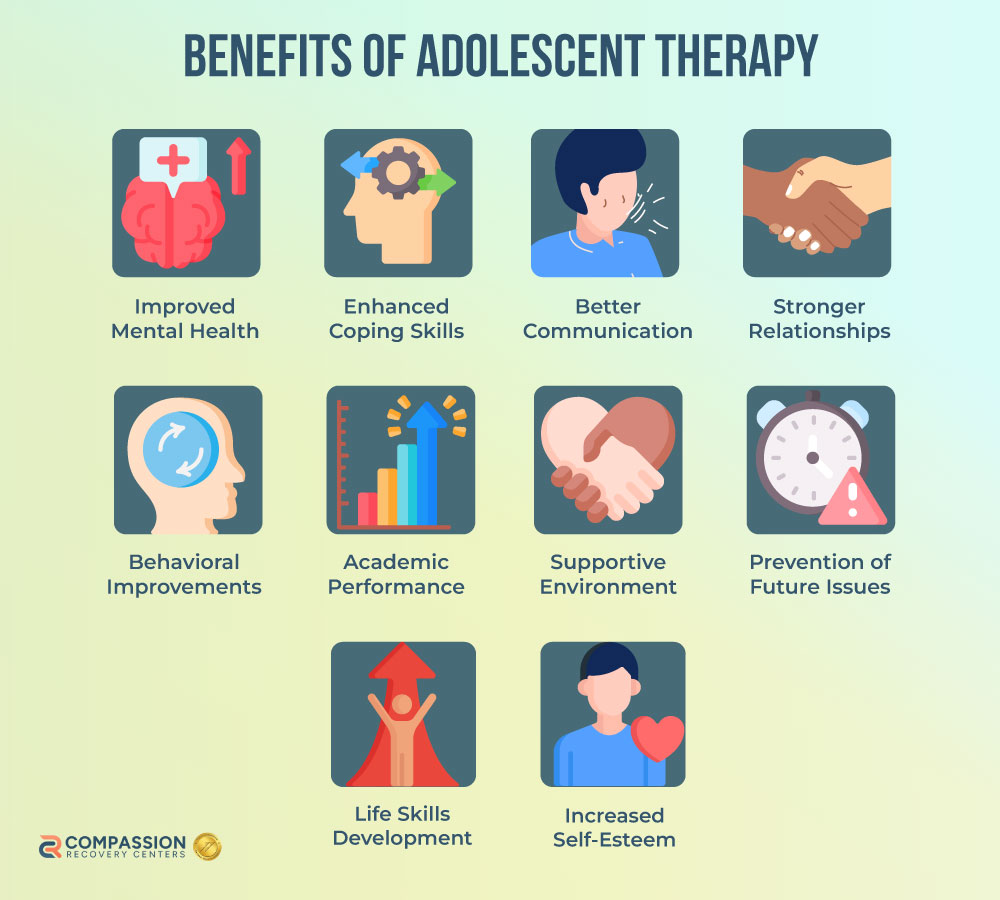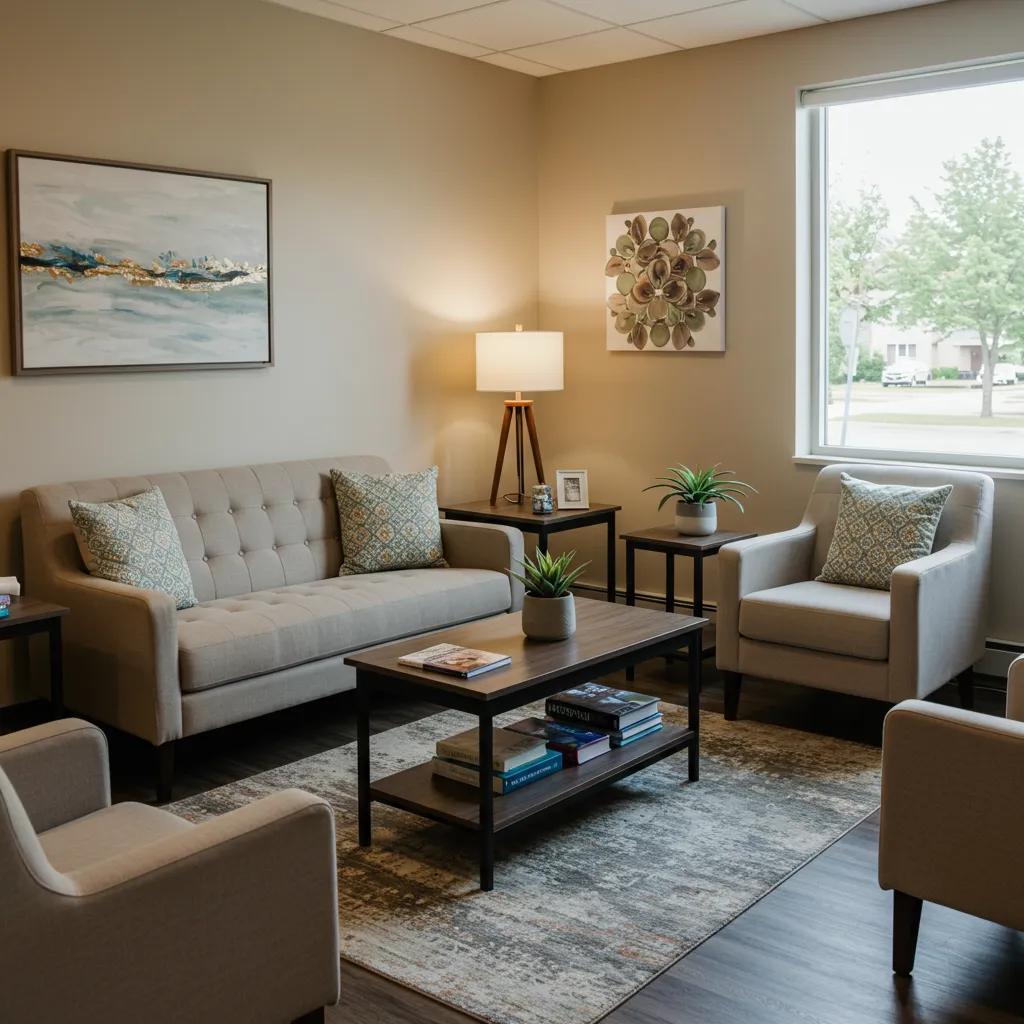Adolescence therapy helps with teenage issues such as mental health, transitional stress, and self-esteem. However, it can be a daunting task to understand the complex mental problems adolescents deal with and find the right adolescent therapy near you to treat them. This blog will ease your query about the best Adolescence therapy near me with the following solutions:
- Knowing Adolescence Therapy
- Which therapy is required for teen mental health conditions
- Psychiatrist recommendation to finding Adolescence therapy near you
- Criteria for choosing Adolescence therapy
Compassion Recovery Centers provides adolescent therapy near you with years of teenage psychiatry experience. Call to consult your options (877) 414-3007
Adolescence Therapy: How it Really Works
In adolescence, or you can say teen counseling, therapists or psychiatrists apply a variety of techniques to intervene in the culprits that affect their daily lives. Therapists mainly target by
- Talking
- Co-curricular activities such as playing games, drawing, and writing
- Evidence-based therapies
- Counseling
In addition to talking about their thoughts and feelings, therapists may also provide additional support via medicine or group therapy to address the underlying mental health problem. Adolescents in their teenage face a variety of problems, such as:
- Peer Pressure
- Anxiety
- ADHD
- PTSD
- Depression
- Obsessive Compulsive Disorder (OCD)
- Mood or personality disorders
However, the most common mental health challenges faced by teenagers are anxiety and depression, which adolescents require therapy for.

Knowing the First Line of Treatment for Adolescent Anxiety
Antidepressants termed selective serotonin reuptake inhibitors (SSRIs), which work by increasing serotonin in the brain, which is responsible for happiness, are considered the best and first line of treatment against teenage anxiety. It is applied side by side with other psychotherapies.
Adolescence Depression Psychotherapy: What It Requires?
Depression requires understanding the underlying cause of depressive episodes, which reduces pleasure and interferes with a person’s ability to function properly. However, According to APA, Cognitive-behavioral therapy is deemed to be the most successful therapy against adolescent depression treatment by changing the negative thinking patterns leading to depression.
Get your question answered now.
Top Psychiatrist Recommendations: What to Look for in Adolescence Therapy Near You
Psychiatrists dealing with teenagers having mental health issues such as anxiety, depression, and PTSD first suggest understanding the symptoms a person is going through. There is no hard and fast rule about who needs therapy and who doesn’t. Sometimes, a teen just wants to talk to someone about how they feel about certain things. Our DHCS-certified psychiatrists have recommended three recommendations to those seeking adolescent therapy near them.
1) Type of Adolescence Therapy You Will Be Taking: Understand Your Symptoms
Sudden behavioral changes are the most frequent signs of attending a therapist. However, some of the cautious signs that you should seek immediate help include:
- Recurring sadness and depression
- Always thinking about suicide
- Social isolation
- Sudden weight loss
- Substance abuse
- Extreme mood swings
Many would say that they are only wanting attention. Still, research says that such thoughts are associated with overwhelming emotional pain and a sense of being alone or a burden to others. Depending on the above symptoms, a teen will go through different psychotherapies, such as:
- Cognitive-behavioral therapy
- Mentalization-based therapy
- Interpersonal psychotherapy
- Dialectical behavioral therapy
- Acceptance and commitment therapy
- Mindfulness
- Attachment-based Family therapy
- Peer support
- Motivational interviewing
- Assertive community treatment
- Contingency management
All such therapies can be dispensed under professional psychiatrists in different treatment plan types, which is the next major thing to decide when choosing adolescent therapy near you.
2) Choosing a Personalized Treatment Plan for Therapy
The second most important aspect of beginning adolescent therapy is to choose which treatment plan is most suitable for you. Depending on the rehab type, there are numerous options, such as:
Consult your treatment provider about which treatment program is best suited according to your feasibility and condition of mental health illness.
3) What To Expect in Your First Adolescence Therapy Session
Every adolescent therapy session starts with an organized session consisting of the following steps.
Warm and Safe Environment
The therapist will create a comfortable environment around you to open up about your struggles.
Personal History Discussion
You will discuss your background, which includes family, school, work, and social life. It will also include any previous history related to mental health or substance use disorder.
Understanding Current Issues
The therapist will ask about the current issues that led you to take therapy.
Goal Setting
Identifying and setting goals for what you hope to achieve through therapy. How will you improve in practical life regarding important decisions?
Description of the Therapy Process
The therapist will describe to you what adolescent therapy is like and the confidentiality rules.
Building Trust
Through continuous discussion, the therapist will build trust and ensure that the therapy is completely transparent and that the process goes smoothly.
Open Communication
You are encouraged to open up about how you feel and think about your negative thoughts and the actual problem leading to such thinking patterns.
Which Therapy Is Best for Adolescents? Know the Suitable Option
Dialectical behavioral therapy (DBT) is proven to be the best suited for adolescents as it covers irregular emotional behavior. It emphasizes the negative feelings that a teen faces, such as suicidal thoughts and self-harm, and allows the teen to face them positively with the strategies most suitable.
Criteria for Choosing an Adolescence Therapy Center Near You
Psychiatrists recommend following guidelines in choosing an adolescent therapy center near you
- Ensure the center and therapists are accredited and licensed appropriately according to your relevant issue and treatment program.
- Choose a center with numerous well-known therapeutic modalities, such as CBT, DBT, and family therapy.
- Check for the presence of highly competent professionals who are DHCS certified and specially trained to take care of adolescents.
- Go through the online reviews or ask around regarding their treatment reputation.
- Make sure that parents are allowed to be part of the treatment.
- The facility should be easily accessible through public and private transport.
- They offer an aftercare program to prevent relapse
After these conditions are satisfied by your mental health treatment provider, you can begin your adolescent therapy right away!
Compassion Recovery: Personalized Adolescence Therapy Provider Near You
We know how hard it is for teens and young ones to talk to someone about their feelings. Compassion recovery centers are equipped with professional adolescent counselors to help you with all of your teen struggles with mental illness. We provide various treatment options and insurance, such as
- Aetna
- Blue Shield
- Cigna
- Anthem
- United Healthcare
Verify your benefits and start your therapy today!
Frequently Asked Queries About Adolescence Therapy Near You
Teens often ask queries about adolescent therapy, such as:
What Is the Youngest Age for Therapy?
The youngest age to get therapy is recommended to be three years old generally. But it depends on developmental ability or when a child could require therapy.
What Age Is Adolescent Psychotherapy?
Anyone under age 18 is eligible for getting adolescent psychotherapy. However, certain conditions, such as developmental and socioeconomic conditions, may increase or decrease the age factor when getting therapy.
What Is the Most Common Mental Health Disorder in Adolescence?
Anxiety disorders are considered to be the most common mental health disorders among adolescents. According to reports, 1 in 8 adolescents suffer from anxiety disorder at any given time.
Resources
- 1) (2024). Apa.org [https://www.apa.org/depression-guideline/children-and-adolescents#:~:text=Cognitive2DBehavioral%20Therapy%20(CBT]
- 2) World Health Organization. (2021, November 17). Mental health of adolescents. World [https://www.who.int/news-room/fact-sheets/detail/adolescent-mental-health]
- 3) DHCS. (2023). Ca.gov. [https://www.dhcs.ca.gov/provgovpart/Pages/Licensing-and-Certification-Facility-Certifiction.aspx]
- 4) Mental Health Disorders in Adolescents. (n.d.). Www.acog.org. [https://www.acog.org/clinical/clinical-guidance/committee-opinion/articles/2017/07/mental-health-disorders-in-adolescents#:~:text=Anxiety%20disorders%20are%20the%20most]
Did You Know? According to WHO, one out of every seven teens is struggling with some sort of mental illness.










